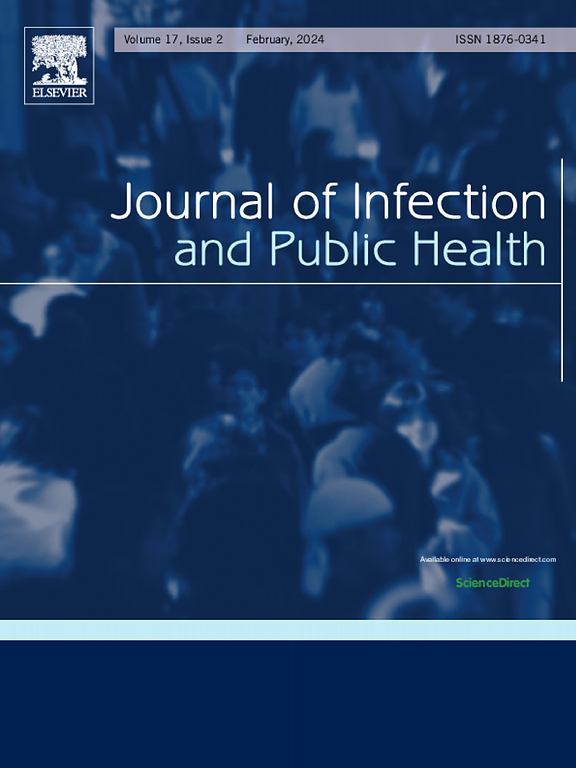越南四个地区医院抗菌药物管理方案的可行性
IF 4
3区 医学
Q1 INFECTIOUS DISEASES
引用次数: 0
摘要
过量和不当使用抗菌素是抗菌素耐药性的主要驱动因素。抗菌素管理(AMS)通过促进明智地使用抗菌素来解决这一问题。本研究评估了越南地区医院辅助医疗服务计划的可行性和有效性。方法在越南4个地区医院进行为期6个月的前后对照研究。干预措施包括(i)建立医疗辅助队委员会和小组,(ii)分发抗菌素指南,(iii)对医护人员进行培训,以及(iv)对抗菌素处方的适当性进行定期标准化审计,然后提供量身定制的反馈。共同主要结局是(i)每月抗菌药物在医院的使用和(ii)抗菌药物处方根据指南的适当性,在AMS计划之前和之后。次要结局包括抗菌素费用和全因死亡率的变化。结果:在所有四家医院中,医疗辅助服务项目在利益相关者的积极参与和员工的高度参与下成功实施。在基线时,454张抗菌药物处方中有79. %(95% % CI: 74.9 %,83.7 %)是不合适的,主要是由于持续时间过长、药物过于广谱或剂量不正确。干预后未观察到改善,992个处方中有80.3 %(95 % CI: 77.4% %,83.1 %)被认为是不合适的。干预后抗菌药物用量略有减少,每月减少4.2 DDD/100床日(95 % CI: - 6.2, - 2.3)。抗微生物药物费用没有变化。干预后全因死亡率降低[RR = 0.32(95 % CI: 0.09, 0.92)]。结论在越南地区医院实施综合医疗辅助系统干预措施是可行的,可适度降低抗菌药物的使用和全因死亡率。然而,不适当处方的持续高比率突出表明,需要更广泛地实施和加强管理工作,以便在地区一级更有效地解决导致抗菌素耐药性的主要因素。本文章由计算机程序翻译,如有差异,请以英文原文为准。
Feasibility of an antimicrobial stewardship program in four district hospitals in Vietnam
Background
Excessive and improper use of antimicrobials is a major driver of antimicrobial resistance. Antimicrobial stewardship (AMS) addresses this by promoting judicious use of antimicrobials. This study evaluated the feasibility and effectiveness of an AMS program in district hospitals in Vietnam.
Methods
A before-and-after study was undertaken in four district hospitals in Vietnam over 6 months. Interventions included (i) establishing AMS committees and teams, (ii) distribution of antimicrobial guidelines, (iii) healthcare worker training, and (iv) conducting periodic standardised audits of appropriateness of antimicrobial prescriptions, followed by tailored feedback. The co-primary outcomes were (i) monthly antimicrobial consumption in the hospital and (ii) appropriateness of antimicrobial prescribing according to guidelines, before and after the AMS program. Secondary outcomes included changes in antimicrobial costs and all-cause mortality.
Results
The AMS program was successfully implemented with strong stakeholder engagement and high staff participation across all four hospitals. At baseline, 79.0 % (95 % CI: 74.9 %, 83.7 %) of 454 antimicrobial prescriptions were inappropriate, primarily due to prolonged duration, overly broad-spectrum agents, or incorrect dosing. No improvement was observed post-intervention, with 80.3 % (95 % CI: 77.4 %, 83.1 %) of 992 prescriptions deemed inappropriate. A modest reduction in antimicrobial consumption was seen post-intervention, with a decrease of 4.2 DDD/100 bed-days per month (95 % CI: – 6.2, – 2.3). Antimicrobial costs were unchanged. All-cause mortality reduced post-intervention [RR = 0.32 (95 % CI: 0.09, 0.92)].
Conclusion
AMS interventions were feasible to implement in district hospitals in Vietnam and resulted in modest reductions in antimicrobial consumption and all-cause mortality. However, the persistently high rates of inappropriate prescribing highlight the need for broader implementation and strengthening of stewardship efforts to more effectively address key drivers of antimicrobial resistance at the district level.
求助全文
通过发布文献求助,成功后即可免费获取论文全文。
去求助
来源期刊

Journal of Infection and Public Health
PUBLIC, ENVIRONMENTAL & OCCUPATIONAL HEALTH -INFECTIOUS DISEASES
CiteScore
13.10
自引率
1.50%
发文量
203
审稿时长
96 days
期刊介绍:
The Journal of Infection and Public Health, first official journal of the Saudi Arabian Ministry of National Guard Health Affairs, King Saud Bin Abdulaziz University for Health Sciences and the Saudi Association for Public Health, aims to be the foremost scientific, peer-reviewed journal encompassing infection prevention and control, microbiology, infectious diseases, public health and the application of healthcare epidemiology to the evaluation of health outcomes. The point of view of the journal is that infection and public health are closely intertwined and that advances in one area will have positive consequences on the other.
The journal will be useful to all health professionals who are partners in the management of patients with communicable diseases, keeping them up to date. The journal is proud to have an international and diverse editorial board that will assist and facilitate the publication of articles that reflect a global view on infection control and public health, as well as emphasizing our focus on supporting the needs of public health practitioners.
It is our aim to improve healthcare by reducing risk of infection and related adverse outcomes by critical review, selection, and dissemination of new and relevant information in the field of infection control, public health and infectious diseases in all healthcare settings and the community.
 求助内容:
求助内容: 应助结果提醒方式:
应助结果提醒方式:


